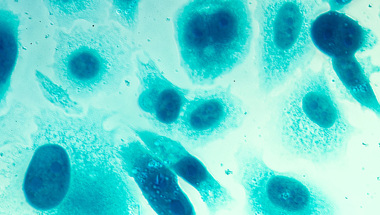
Understanding enzalutamide resistance to help find new treatments

Grant information
Reference: RIA24-ST2-005
Lead researcher: Professor Imran Ahmad
Institution: University of Glasgow
Award: £512,319
What you need to know
- Some men with advanced prostate cancer stop responding to the hormone therapy enzalutamide. This project explores why that happens.
- The researchers are focusing on two genes that normally help keep cancer growth in check. When these genes are faulty or missing, the cancer can become resistant to treatment.
- By studying these changes, the team hope to find new targets for future treatments, as well as tests to help men get more personalised treatment options.
Why are we funding this research?
Advanced prostate cancer is often treated with hormone therapies like enzalutamide, which work by blocking signals that help the cancer grow. But for some men, the cancer finds a way around this and starts growing again - this is called treatment resistance, and it leaves these men with few options to manage their cancer.
Right now, we don’t fully understand why this happens or how to stop it.
By understanding how these two genes affect treatment resistance, the team hopes to find new ways to spot it early, possibly through a simple blood or urine test, and to develop better treatments that work even when enzalutamide doesn’t.
What will the researchers do?
Advanced prostate cancer is often treated with hormone therapies like enzalutamide, which work by blocking signals that help the cancer grow. But for some men, the cancer finds a way around this and starts growing again - this is called treatment resistance, and it leaves these men with few options to manage their cancer.
Right now, we don’t fully understand why this happens or how to stop it.
By understanding how these two genes affect treatment resistance, the team hopes to find new ways to spot it early, possibly through a simple blood or urine test, and to develop better treatments that work even when enzalutamide doesn’t.
This funding will be invaluable to allow my lab to continue our work to investigate resistance mechanisms in patients with advanced prostate cancer. My lab has pioneered many cutting-edge models that we can apply to interrogate the disease process in enzalutamide resistant disease, with the hope of identifying novel drug targets to help patients living with and dying of treatment-resistant prostate cancer.
How will this benefit men?
Right now, when a drug like enzalutamide stops working, there aren’t many options left.
If the researchers can understand how these genes affect the cancer’s behaviour, they could help doctors spot resistance earlier – possibly through a simple blood or urine test. That means men could switch treatments sooner, before the cancer gets worse.
It also opens the door to new treatment combinations that might keep the cancer under control for longer. So instead of a one-size-fits-all approach, men could get treatments tailored to how their cancer is behaving.
Help us fund more research like this
Your donation helps us fund lifesaving research into better treatments for prostate cancer.





